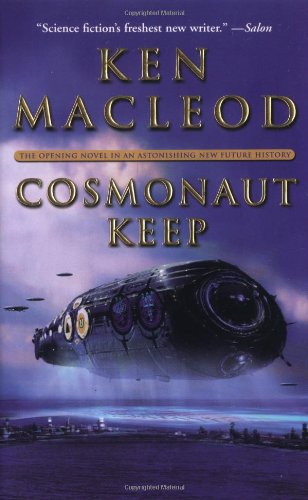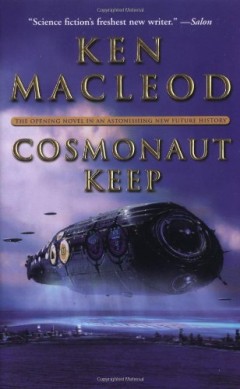
Cosmonaut Keep is the first book of the Engines of Light trilogy by Ken MacLeod, combining space opera with a unique take on the ufo mythos and a variety of leftist and libertarian political perspectives. It is told in two widely different alternating timelines, both focusing on the dream of interstellar travel.
The first timeline is set in a near-future Edinburgh, in a world where a neo–Soviet Russia has beaten back the United States and installed a kinder, gentler socialism in Europe. Matt Cairns is a computer programmer, and a member of the International Workers of the World Wide Web (or Webblies). He stumbles upon a group of American libertarians trying to overthrow the Party for fun and profit, and ends up carrying a mysterious data disk containing what appear to be plans for light-speed travel and an antigravity spaceship. Meanwhile, a rebellious European space station claims to have made first contact with aliens within an asteroid.
The second timeline is set on Mingulay, a planet in the Second Sphere, an ancient multispecies civilization. The two oldest species are the krakens and the saurs, both millions of years old. The krakens (bioluminescent and intelligent giant squid) navigate the lightspeed starships that ply the Second Sphere, while the saurs (secretive beings descended from bipedal dinosaurs who look suspiciously like the Greys of ufology) pilot gravity skiffs (read: flying saucers). In addition to two other species of hominid, there are also humans descended from those abducted from Earth by the saurs and taken to the Second Sphere over the millenia. Above all are the gods, superintelligent communities of extremophile bacteria who live in comets and asteroids, whose one and only commandment is “Leave us alone!” In this timeline, we follow Gregor Cairns — a member of the Cosmonaut Families, the descendents of the crew of a human-piloted starship from Earth — whose family has been working secretly on an interstellar navigation problem for two hundred years.

There are many references to geek culture, including a hilarious Linux loading screen. The politics range from anarcho-syndicalism to Trotskyism to libertarian capitalism, with no one perspective really dominant; the communism of the European Union is presented as being better than the previous run, but not a utopia by any means. The book is full of scenes that are just great fun: one that stands out in my mind describes the use of flying saucers to herd dinosaurs off of cliffs.
The story drags a little in the beginning, but picks up quickly. The alternating timelines are somewhat confusing at first, but towards the middle of the book it all starts to tie together. The one thing that really detracted from the story are the parallel love triangles, with grown adults falling in and out of love like teenagers.
All in all, I loved this book, and it serves as an excellent first volume of the trilogy.















